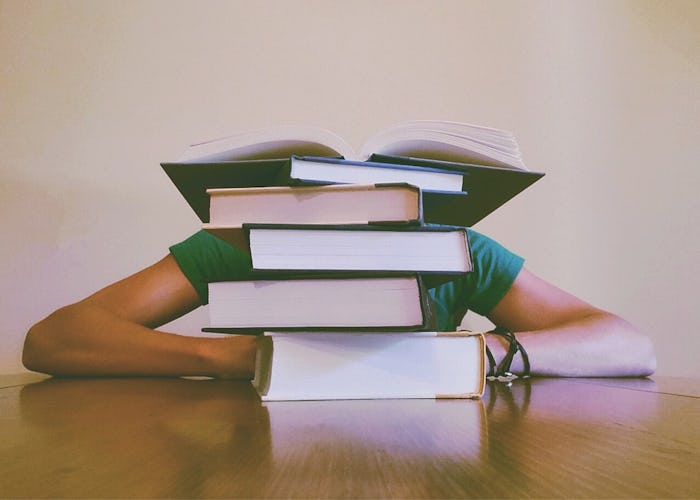Life

9 Ways To Do Better On Your Finals, According To Science
The rest of the world might be singing "It's The Most Wonderful Time of the Year," but if you're in school you're probably stressing over end of the semester tests, and look for ways to do better on finals. One way to prep for exams is to hibernate in a study space, eating every meal out of a vending machine and re-reading everything on your course syllabus. And while TV sitcoms would like you to believe that's how studying for finals should go, not only is it not the best way to get your work done; it's actually counterproductive.
If you do want to ace your exams and see notable improvement, you have to be strategic about your studying. Simply hitting the books with no plan is not going to be the most effective way to maximize your learning. If you want to work efficiently, you need to have an understanding of what will actually help you recall all those obscure facts when you sit down to take the test. Science has found that there are certain ways to study that will improve your test-taking skills, therefore leaving you with a higher GPA. Here are some tips to ensure that you're making the most of your study sessions.
1Quiz Yourself
Don't save the questions for exam day: test yourself. A study from Washington University in St. Louis found that taking a test is actually a great form of learning, as it helps long term retention of facts and solidifies knowledge better than simply studying the material multiple times. So after you've gone through the material once, instead of re-reading your study guide go ahead and ask yourself questions you might anticipate seeing on the final. Flashcards, a game of Jeopardy with your study group, or simply grilling yourself as you make your lunch are all great ways to test your knowledge.
2Write It Down
It's tempting to do everything on your computer, I know, but research from Princeton University has shown that writing down information is the best way to remember it, and writing by hand is superior to typing. Start studying by rewriting your notes from class, giving the most attention to the most significant topics. The re-written information can then serve as a study guide as you get closer to the test date.
3Watch What You Eat
Don't let the stress of studying cause you to subsist on Cheetos and Tootsie Rolls alone. Yes, buy some to snack on intermittently, but make sure you're getting your nutrients as well. The Wall Street Journal notes that eating a balanced diet that includes fruits and vegetables will keep your brain energized and functioning at its full capacity. Getting enough omega-3 fatty acids can also help your working memory, so be sure to feast on some fish!
4Work Your Mind And Your Body
It's tempting to take on a sedentary lifestyle during finals week, but skipping your daily workout to get more cram time is actually doing you a disservice. Studies find that exercise actually boosts brain function, improving learning and memory. Take a much-needed breather from the books and get in a half hour of aerobics.
5Give Yourself A Break
Marathon studying is not going to work best. Instead, try to study in shorter bursts. Psychology Today notes that spacing out your study sessions helps with memory retention, since you are re-solidifying the information each time. And it turns out that a longer space between reviewing is better, so don't be afraid to actually take a legitimate study break.
6Get Your Sleep
All-nighters are not your friend. You need to sleep. Staying up to study more will only hurt your test-taking skills; sleeping helps you to retain and remember all of the things you are reading and learning. So seriously, go to bed!
7Pump Up The Jams
If finals have you stressed out of your mind, the answer might be plugging in your headphones and listening to some tunes. Research found that music helps to relieve stress, especially classical music, which is great for studying because there are no lyrics. So find a Beethoven Spotify playlist and get listening to some instrumental tracks.
8Study Before Bed
I know watching Netflix as you fall asleep feels like a relaxing end to a long day, but Time reports that studying right before you go to sleep is actually the best time to go over the toughest facts. Whatever you study right before you hit the hay will be easiest to remember when you wake up, since the information is solidified into your memory during the sleep cycle. So it's almost like you're learning in your sleep, which is pretty cool.
9Change It Up
Find more than one study space on campus where you like to do your work. Studying in just one place every time means you're going to subconsciously link fact recall to the location, which will make it harder to recall the facts when you're in a different environment like, say, the exam room. If you move from spot to spot when you're studying, though, you'll make many associations, which will strengthen the memory. So keep it fresh and find a new space every day!
Images: wokandapix/Pixabay; Giphy (9)